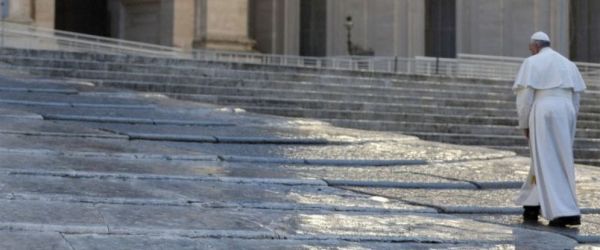There is a recurring question in Pope Francis' meditations during Masses celebrated at Santa Marta, and it is an invitation to examine one's conscience: "How is my relationship with the Holy Spirit?" In his homily [...] the Pontiff repeated the question with a particular twist: "Do I truly believe that the Spirit makes the kingdom of God grow in me?"
The kingdom of God was in fact the theme of the reflection that took its cue from the passage from Luke's Gospel (17:20-25) in which the doctors of the law ask Jesus: "You preach the kingdom of God, but when will the kingdom of God come?" It is a question, the Pope explained, that also came from the "curiosity of many people," a "simple question that comes from a good heart, the heart of a disciple." It is no coincidence that it is a recurring request in the Gospel: for example, the Pope suggested, in that "very ugly, dark" moment when John the Baptist — who was in darkness in prison and "understood nothing, anguished" — sent his disciples to say to the Lord: "But tell us: are you the one, or should we wait for another? Has the kingdom of God come or is it someone else?'.
The doubt about 'when' often returns, as in the 'brazen, arrogant, evil question' of the thief: 'If you are the one, come down from the cross', which expresses the 'curiosity' about 'when the kingdom of God will come'.
Jesus' answer is: "But the kingdom of God is among you." Thus, for example, Francis recalled, "the kingdom of God was announced in the synagogue of Nazareth, that joyful announcement when Jesus reads that passage from Isaiah and ends by saying: 'Today this scripture has been fulfilled in your hearing.'" A joyful and, above all, 'simple' proclamation. In fact, 'the kingdom of God grows in secret', so much so that Jesus himself explains it with the parable of the seed: 'no one knows how', but God makes it grow. It is a kingdom that 'grows from within, secretly or hidden like a gem or a treasure, but always in humility'.
Here the Pontiff inserted the key passage of his meditation: "Who gives growth to that seed, who makes it sprout? God, the Holy Spirit who is in us." This consideration explains the coming of the kingdom through the work of the Paraclete, who 'is a spirit of meekness, humility, obedience and simplicity'. And it is the Spirit, added the Pope, 'who makes the kingdom of God grow, not pastoral plans or great things...'.
It is, said Francis, a hidden action. The Spirit "makes it grow, and the time comes and the fruit appears." An action that escapes full understanding: "Who was it," asked the Pope, "who sowed the seed of the kingdom of God in the heart of the good thief? Perhaps his mother when she taught him to pray... Perhaps a rabbi when he explained the law to him...". What is certain is that even though he forgot it in his life, that hidden seed was made to grow at a certain point. All this happens because "the kingdom of God is always a surprise, a surprise that comes" because "it is a gift given by the Lord".
In his conversation with the doctors of the law, Jesus dwells on the characteristics of this silent action: "The kingdom of God does not come in such a way as to attract attention, and no one will say, 'Here it is, or there it is.'" In fact, the Pope added, 'the kingdom of God is not a spectacle' or even 'a carnival'. It does not show itself 'with arrogance, with pride, it does not like publicity', but 'it is humble, hidden, and thus it grows'.
A striking example comes from Mary. When people looked at her following Jesus, they hardly recognised her ("Ah, that's his mother..."). She was "the holiest woman," but since she was "hidden," no one understood "the mystery of the kingdom of God, the holiness of the kingdom of God." And so, "when she was near her son's cross, people said: 'Poor woman, with such a criminal for a son, poor woman...'". No one understood, "no one knew".
The characteristic of concealment, the Pope explained, comes precisely from the Holy Spirit who is 'within us': it is he 'who makes the seed grow, makes it sprout until it bears fruit'. And we are all called to follow this path: 'it is a vocation, it is a grace, it is a gift, it is free, it cannot be bought, it is a grace that God gives us'.
That is why, the Pope concluded, it is good that "all of us who are baptised" and "have the Holy Spirit within us" ask ourselves: "How is my relationship with the Holy Spirit, the one who makes the kingdom of God grow in me?" We need to understand: "Do I truly believe that the kingdom of God is among us, hidden, or do I prefer spectacle?" We must, he added, pray to "the Spirit who is in us" to ask for the grace "to make the seed of God's kingdom sprout in us and in the Church with strength, so that it may grow, give shelter to many people and bear fruits of holiness."
[Pope Francis, St. Martha, in L'Osservatore Romano, 17/11/2017]












